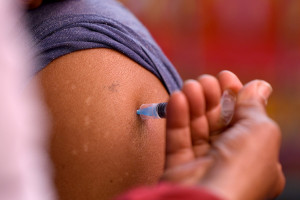Health
Nepal grants conditional emergency use approval to Russian Sputnik V vaccine
This is the fourth Covid-19 vaccine to get emergency use approval after AstraZeneca’s Covishield, Bharat Biotech’s Covaxin and Sinopharm’s BBIBP-CorV.
Arjun Poudel
At a time when the country is witnessing a steep surge in new cases, Nepal’s national drug regulatory authority has granted emergency use approval to Sputnik V, a viral vector vaccine for Covid-19 developed by Gamaleya Research Institute of Epidemiology and Microbiology of Russia.
A meeting of the drug advisory committee of the Department of Drug Administration on Tuesday decided to issue a conditional emergency use authorization to the vaccine, according to a press statement issued by the department.
With this, the number of vaccines granted emergency use authorisation has reached four.
“The company had applied for emergency use approval through the local supplier in Nepal, “ Santosh KC, spokesperson for the department, told the Post. “Based on the data provided by the suppliers of the company, we have given a conditional emergency use authorisation.”
Lomus Pharmaceuticals Pvt. Ltd had applied for emergency use authorisation of the Sputnik V vaccine, according to KC.
According to the Lancet, the Sputnik V vaccine’s efficacy is reported at 91.6 percent.
The vaccine has to be stored in 2 to 8 degrees Celsius. The storage requirements can be supported by Nepal’s vaccine storage and transport infrastructure.
Earlier this year, the department had granted conditional emergency use authorisation to three Covid-19 vaccines — Covishield developed by the University of Oxford and pharmaceutical giant AstraZeneca, which is being manufactured by the Serum Institute of India, BBIBP-CorV vaccine, developed by China’s Sinopharm, and Covaxin developed by Bharat Biotech and India's homegrown government-backed vaccine.
Emergency use authorisation is granted for some drugs and vaccines by authorities during a declared emergency when officials can make a judgment that the drug is worth releasing—even without all the evidence that would fully establish its effectiveness and safety. Such a decision is taken when there’s enough evidence to suggest that patients have benefited from the drug/vaccine.
Some 1.8 million people have been vaccinated with the first dose of Covishield from January 27 and its second dose was administered for frontline workers and others who received the jab in the first phase of the vaccination campaign from Tuesday. The immunisation programme for the second dose will be continued until April 24.
Some 100,000 people have been vaccinated with the Chinese BBIBP-CorV vaccine between April 7 and 18. More will be given this vaccine from April 24, according to officials of the Ministry of Health and Population.
But India’s Covaxin has not been used in Nepal.
With the Serum Institute of India yet to supply one million doses of Covishield for which Nepal has made 80 percent of the payment and to respond on supplying another 5 million doses, the government has been scampering to get vaccines.
Nepal has to immunise 72 percent of its 30 million population.
The government has currently suspended the vaccination drive with no immediate plans to resume it as it is struggling to acquire vaccines.
On Tuesday the Health Ministry said 1,667 people were infected in the last 24 hours and 11 people had died from Covid-19 complications. Active cases across the country stands at 8,659.
So far there have been 287,567 positive cases and 3,102 deaths.




 9.8°C Kathmandu
9.8°C Kathmandu















